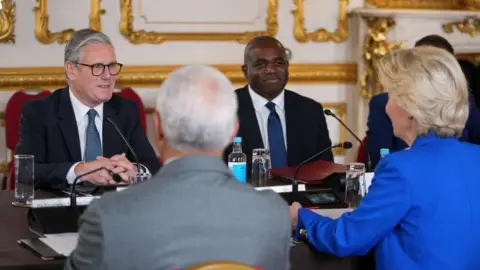Chris Mason: EU deal a reminder of an uneasy relationship
 PA Media
PA MediaThe self-imposed guardrails the government had imposed in these post-Brexit negotiations intentionally limited its room for manoeuvre.
There will be no return to the European Union's customs union or single market or freedom of movement.
So there was, then, a risk of pleasing few in the changes they agreed to: those who see themselves as custodians of the original Brexit deal would see it as an unforgivable dilution - and some do.
And those who have consistently argued Brexit is a disaster would regard ministers as shamefully unambitious - and some do.
Sir Keir Starmer's calculation appears to be that a majority are of neither of those views, but keen to see what they would describe as improvements around the edges of the existing deal.
Folk in government seem pretty chipper with how it is going down, at least initially.
The prime minister, talking to business leaders in Downing Street, claimed "we have dramatically improved our trading ties with the largest economy in the world, the US, the fastest growing economy in the world, India and the largest trading bloc in the world, the EU".
Granted the Indian deal is broad.
The deal with the US is much thinner, but did stop likely job losses in the automotive industry.
The deal with the EU seeks to smoothen frictions in trade, but there are a whole load of details and specifics, timeframes and costs still to be haggled over and sorted.
- UK now best placed country on trade - Reeves
- UK-EU deal moves us on from Brexit rows, Starmer says
- What will 'reset' deal mean for UK economic growth?
Some Brexiteers say not only is it in parts thin and oversold, but has also crossed a crucial rubicon: the acceptance of "dynamic alignment" in some areas - not just signing up to EU rules as they are now, but tolerating them when they change, with limited opportunities to stop them changing.
The European Commission President, Ursula von der Leyen, when I asked her about just this, said that had been the UK's sovereign choice.
Indeed it had, but it does still amount to a case study in a classic Brexit trade-off of making trade easier at the expense of handing over some power.
Worthwhile say ministers. Breaching a sacrosanct principle say its critics.
While the arguments about all this, unlike during the noisy Brexit years, will probably slip back into the background most of the time, the ongoing conversation and negotiation will matter.
It will determine how much this will cost, precisely what it will mean for defence co-operation, who and how many young people may be able to travel more easily to the EU and vice versa and whether and by when there is a mutual recognition of professional qualifications.
Even the much talked up easing of queues at EU airports is not certain - it is now down to individual member states to decide on whether to change their approach.
These details and others will matter to many and be an important metric of the real-world impact of this deal beyond the words on its launch day.
We now know this first UK-EU summit is planned to be the first of many - it will be an annual occasion.
It is a reminder that the UK's uneasy relationship with its nearest neighbours existed as members of the European Union and it continues as non-members.
The government calls it a "reset" but in reality resetting, in one direction or another, is probably permanent or semi-permanent.
The trajectory of the current government, within its own guardrails, is towards a closer relationship.
The trajectory of its successors may be different.
